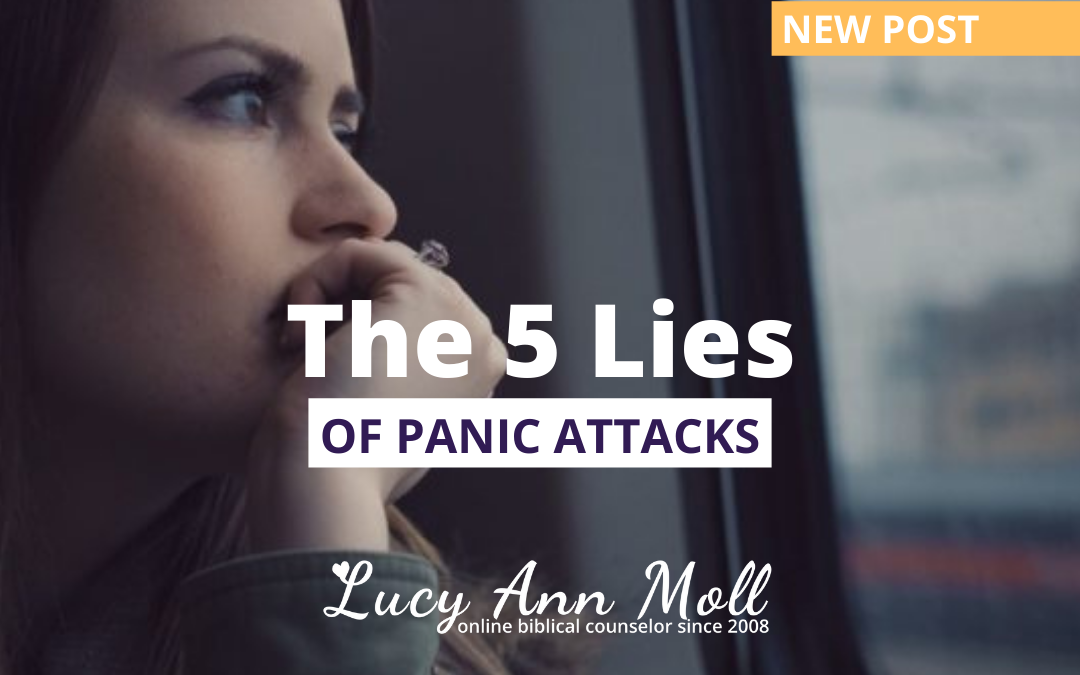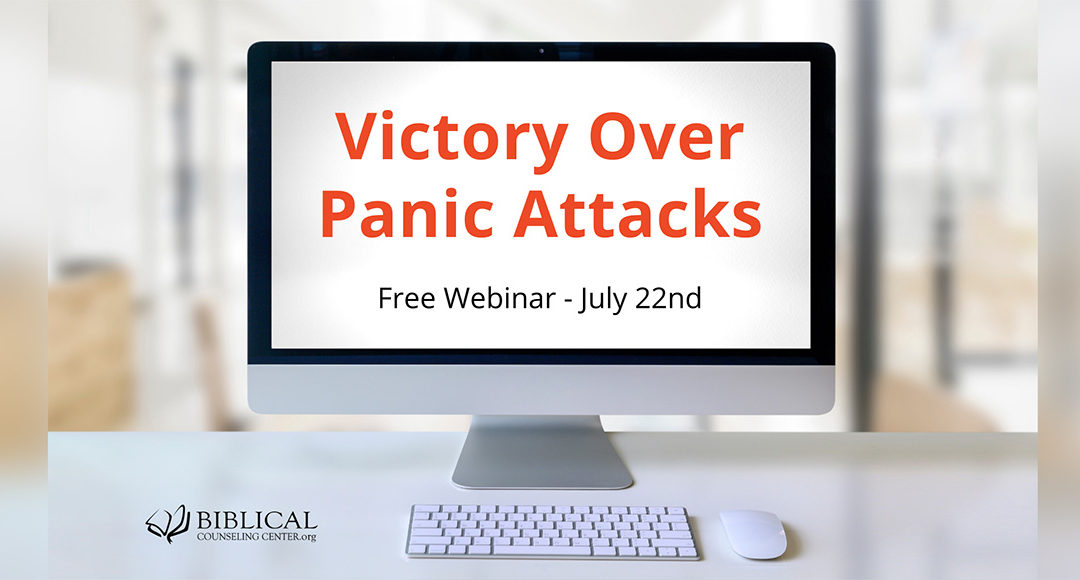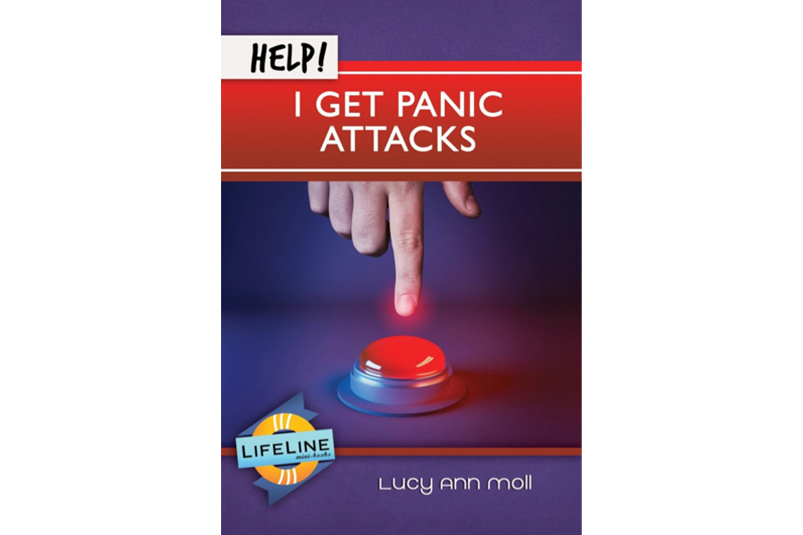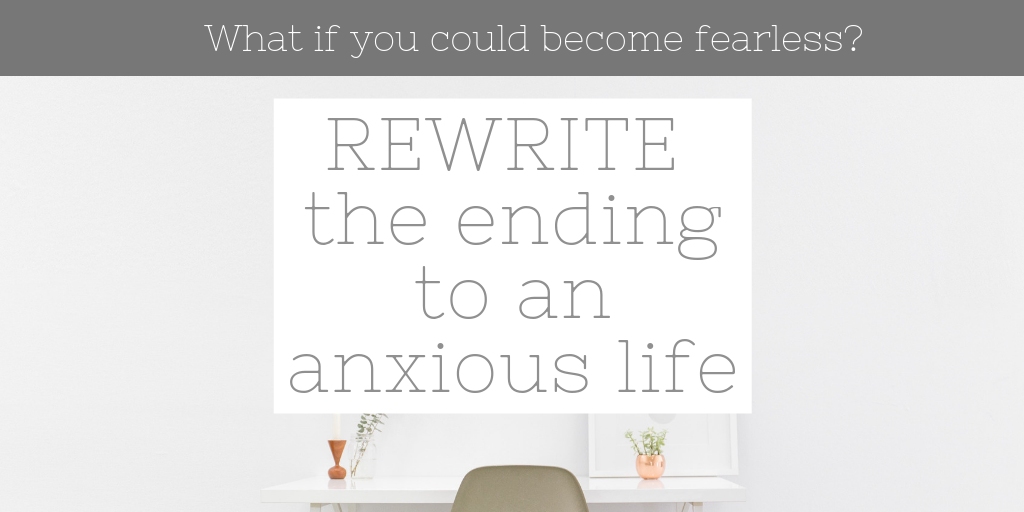
by Lucy | Jul 20, 2021 | biblical counseling |
When panic attacks occur, the sufferer hopes that the terror will stop instantly and never return. This is a certain truth about panic attacks: no one wants them, ever.
Panic attacks are brief episodes of intense dread accompanied by physical symptoms like an irregular or rapid heartbeat and sweaty palms. When you’re in the middle of one, they seem anything but brief.
Let’s uncover the five lies of panic attacks that you need to know, whether you or a loved one has this common condition.[i]
P.S. On Thursday, July 22, at noon CT, I’ll be leading a free live webinar on Victory Over Panic Attacks, and you are invited!
If you cannot make that date, no worries; You can get the replay along with helpful handouts including action plans! But to get them, you must register for the webinar. The spots are filling up, so act now.
REGISTER FOR THE FREE WEBINAR
Lie #1: If God loved me, He would take this away.
TRUTH: God loves you despite your fear.
Knowing the link between fear and panic attacks helps us to gain an accurate view of our anxiety, and to rest in the truth that God loves His children, especially those of us who fight fear (1 Thess. 5:14).
Fear isn’t all bad. It is a God-given emotion that alerts us to danger, real or perceived. Anxiety is what we feel when our body is responding to the emotion of fear.[ii] It is the mind and body’s reaction to stressful situations.
When you or I face a danger (real or perceived), our body releases adrenaline and other chemicals into the bloodstream, setting off a series of physical responses to ready us to act.
For various reasons, some people are more likely to develop panic attacks.[iii] Women are more prone to developing panic attacks than men.
Also, there is a strong genetic link. For instance, people with a close biological family member with panic disorder are up to eight times more likely to develop this condition.
No one wants to be anxious, of course. Yet when we get to the heart of anxiety, we learn what we truly value.
Remember that “you did not receive a spirit that makes you a slave again to fear, but you received the Spirit of sonship. And by him we cry, ‘Abba, Father’” (Romans 8:15).
This can be incredibly empowering. In Christ, you have been set free (Gal. 5:1) and made a child of God, even though you may feel like a slave to the fear of panic attacks.
Lie #2: Only medication can help me, OR if I were a stronger Christian, I wouldn’t need meds.
TRUTH: A balanced approach to medication is wise.
As many more Americans have turned to anxiety prescription medication since the coronavirus crisis to calm their nerves,[iv] we may wonder about their role in easing panic attacks.
- Is medication the best option to address panic?
- Should we avoid medication altogether?
- Does using medication mean I’m a weak Christian?
First, no medication cures panic attacks. Rather, medicine can work to change the way that the body responds to fear, usually by slowing a normal biological process that is responding to a perceived danger.
Second, no medication can change our thinking. Only counseling can do that, whether from a friend or a biblical counselor or through self-counsel.
Medication can address these responses sometimes, but it does not deal with the heart. As a top article at Biblical Counseling Center’s websites puts it:
Medicine can change the way anxiety feels, but it can’t address the object of your fear. One of the things we all must realize is that the Creator God designed our bodies to feel fear and for our bodies to respond with energy to put us into motion. Simply muting the intensity of those bodily reactions and feelings by medically suppressing the natural chemical reactions in otherwise healthy bodies doesn’t solve one’s anxious thought patterns.[v]
The counselors at Biblical Counseling Center believe that the decision of whether or not to take anxiety medication is a personal one that is best made in consultation with your physician. Contrary to the popular myth, Biblical Counselors are not opposed to all psychiatric medicine use.
Whether you use medication or have decided against it, or if your loved ones have struggled over your decision, please know that you are never alone. You might remind yourself of this verse when you battle fear:
“The Lord is my light and my salvation;
whom shall I fear?
The Lord is the stronghold of my life;
of whom shall I be afraid?” (Psalm 27:1)
Lie #3: Panic attacks are mostly a physical problem.
TRUTH: The body and mind are intertwined.
The bodily responses to panic are well known: your heart beats double-time, you may be shaky, maybe even lightheaded, and it may feel like a bear is sitting on your chest, metaphorically (or you’d really have something to worry about, right?).
You might also have chills, numbness in the fingers and toes, sweaty palms, and other panic symptoms that sometimes seem to come out of the blue.
Since panic symptoms are physical, this means panic attacks are mostly a physical problem, right? The truth is, while anxiety is entwined with our bodies, it originates in anxious thinking.
“For as [a man] thinks in his heart, so is he” (Proverbs 23:7, NKJV).
What we think, believe, and desire in our hearts is what we do. The heart is the immaterial part of us. It consists of our thoughts, emotions, and will. So, if we imagine that we are in danger, we may run and hide, and have a rapid heartbeat and other bodily responses to fear.
So scary are these symptoms that we may seek emergency medical help. Each year millions of Americans with anxiety-induced panic attacks visit a hospital emergency department complaining of chest pain, trouble breathing, and dizziness, fearing a heart attack.
A researcher found that “anxiety contributed to chest pain experienced by 30 to 40 percent of low-risk patients seen in hospital emergency departments.” [vi] Of course, it is wise that someone showing symptoms indicating a life-threatening disorder would seek emergency care.
As we address our fear, we can learn to slow our anxious thoughts that feed panic attacks.
Lie #4: I just need to do better to avoid my triggers.
TRUTH: Avoiding the situations you fear deepens your fear, so don’t do that.
Let’s start with a definition of a trigger. A trigger is a situation, location, or person that reminds someone of a past or current difficulty,[vii] even a panic attack.
This lie suggests that if we stay away from a feared situation – flying, heights, spiders, driving, and so on – then we will be happier and have more peace because we’ll be panic-free.
But the problem is not the trigger per se. It is our heart response to it. What we fear controls us. Andrea Lee explains it this way:
When we label someone or something a “trigger,” we shift the place of emotional control from our own heart to an external object. The connection between an event and emotion can mistakenly lead us to think the trigger is a cause. Actually, we have developed habits of thoughts in response to pain that continues to lead to these predictable emotional conditions.[vii]
The more we avoid our fears, the stronger they may become. In fact, a panic attack is a one-step-removed problem. When we focus on our physical responses to fear, it is easy to lose sight of our real problem; that is, a habit of anxious thinking.
When we repeatedly think about fearful events that may happen, we unintentionally train our thoughts toward hypervigilance and nervousness. When this habit is formed, it doesn’t take much to have another panic attack.
Scripture informs us to “take every thought captive to obey Christ” (2 Cor. 10:5). This means we need to unlearn our fear habit and rely on God to provide everything we need for victory.
To accomplish this, we can develop action plans that help us before, during, and after a panic attack. In the coming weeks, we’ll tell you more about these action plans that can help you break free from fear.
Lie #5: Counseling can’t help me, it’s a lost cause.
TRUTH: The right counseling that is based on love and truth brings freedom.
No one is beyond hope. While we’ve all had seasons when we feel like giving up, God’s grace is sufficient for us to believe the Gospel and to put our faith into action.
Biblical counseling points us to the timeless and trustworthy truths of God’s Word.
At BCC, we often say, “faith is believing the Word of God and acting upon it, no matter how I feel, knowing that God promises a good result.”
When we face our fear of having a panic attack, we need to make a choice to believe God and his care for us even in the event of another panic attack.
Basically, we need to practice biblical truth, especially Phil. 4:4-9. This passage tells us to rejoice, pray, give thanks, guard our hearts and minds, think about the good things of God, and practice the joyful attitude and living that that apostle Paul had shown believers.
And it ends with this promise: “the God of peace will be with you.”
As we face our fear God’s way, His truth replaces the lies of panic attacks, and we learn the true way of peace:
“You keep him in perfect peace whose mind is stayed on you, because he trusts in you” (Isaiah 26:3).
[i] Every year, up to 11% of Americans experience a panic attack. Approximately 2% to 3% of them go on to develop panic disorder. (Cleveland Clinic, “Panic Disorder”)
[ii] Tim Allchin, “How Jesus Addressed Fear, Worry, and Anxiety,” October 1, 2019
[iii] Katherine Star, PhD, “Panic Disorder Risk Factors,” December 4, 2020
[iv] Bruce Golding, “More Americans Turning to Anxiety Medication amid Coronavirus Pandemic,” May 25, 2020
[v] Tim Allchin, “Should Christians Use Anti-Anxiety Medication?” October 15, 2019
[vi] Indiana University, “Heart Attack or Panic Attack?” April 15, 2019
[vii] Andrea Lee, “Troubled by Triggers,” March 20, 2018

by Lucy | Jul 17, 2021 | biblical counseling |
The free webinar I’ve been promising to you is finally here! At last count, nearly 300 people have registered. I am humbled!
Over the last year, we’ve all seen a general increase in fear and anxiety, either in ourselves or our loved ones. Many times the fear and anxiety subside, but other times they lead to panic attacks.
How can we respond to having panic attacks in ways that glorify God and help us experience more freedom in our lives?
On Thursday, July 22 at 12pm CST, I’ll be leading a free webinar on Victory Over Panic Attacks. As you’ll recall, I am the author of Help! I Get Panic Attacks. I will share the hope I’ve found for overcoming panic. It is hosted by Biblical Counseling Center.
If you or someone you know has a desire to:
- Learn a first step to breaking the pattern of panic attacks
- Understand how faith can impact the experience of panic attacks
- Discern how to find a counselor who can truly help with panic attacks
… then this free webinar is the place to start.
Register now and join us for this free live webinar next week. Space is limited, so register now to save your spot. By the way, don’t worry if you cannot make the live free webinar. As long as you register for it, you’ll receive the replay of it as well as other valuable handouts that will move you toward victory over panic attacks.
REGISTER FOR THE WEBINAR
P.S. Do you know anyone else who would benefit from this webinar? Maybe they’ve struggled with panic attacks or they know someone who has. Please feel free to forward this email and invite them as well!

by Lucy | Apr 16, 2021 | biblical counseling, emotions
Is it possible to live anxiety-free and in peace? To be “anxious for nothing,” as the apostle Paul mandated us believers (Phil. 4:6, NKJV)?
In his book Anxiety: Knowing God’s Peace (P&R Publishing, 2019), Paul Tautges defines anxiety as a distracting care – “to have our minds and our hearts in two worlds.” This distracting care diverts our attention from the eternal Lord to temporal, earthly concerns. Anxiety not only divides our minds, but also weighs us down.
This article appeared first here on the Biblical Counseling Center (BCC) website. I’ve counseled through BCC since 2014 (now exclusively through Telehealth online video), and I specialize in helping women and families overcome fear, worry, and panic.

We can also describe anxiety as the emotion of uncertainty. Sometimes, it reveals itself as a conglomeration of nagging worries. Nothing horrible or deadly, more like a swarm of mosquitoes than an agitated rattlesnake.
At other times, anxiety is a debilitating panic. It can feel like a knife stabbing you in the chest with every breath, or like a lump in the throat, or sweaty palms, or wobbly Jell-O knees, or any number of uncomfortable, unwanted body sensations experienced when we’re highly stressed. It can also show itself as fear of man or any number of other expressions of anxiety.
Whether nagging worries, or debilitating panic, or any other expression of it, anxiety has powerful and negative effects on the body. We’ve all experienced it personally.
Peace through understanding anxiety’s effects
A pressure is first evaluated in the mind. “Do I have enough money in the bank to cover the $200 water bill?” If we check our account and it has several thousands in it, we relax. But if there is only a measly $20, our pulse may quicken and our thoughts may scurry like mice, looking for an answer to our financial conundrum.
 When anxiety persists (and often it does in today’s chaotic times), it can have negative effects on the body: muscular tension, headaches, gastro-intestinal problems, and so forth. When left unresolved, anxiety may lead to depression and other negative emotions as well as phobias, panic attacks, and compulsive behaviors. (Since some of these problems may have an organic, physical cause, it is always wise to consult a health practitioner.)
When anxiety persists (and often it does in today’s chaotic times), it can have negative effects on the body: muscular tension, headaches, gastro-intestinal problems, and so forth. When left unresolved, anxiety may lead to depression and other negative emotions as well as phobias, panic attacks, and compulsive behaviors. (Since some of these problems may have an organic, physical cause, it is always wise to consult a health practitioner.)
When I’m mildly anxious, my upper shoulder muscles often become tight and a tension headache may ensue. If I ruminate on whatever is bothering me into the evening, insomnia is my probable bed companion. Sometimes I stress-eat chocolate.
If my anxiety goes way beyond nagging worries and has catapulted into panic, a horribly frightful and often recurring experience I’ve described in Help: I Get Panic Attacks(Shepherd Press, 2019) and in this blog article, “The Truth of a Panic Attack,” then my bodily sensations may include a racing heart, perspiration, numbness of fingers and toes, feeling faint, and a sense of doom.
With anxiety, we’ve each lived it, hated it, and wished it gone, yet it hangs like chains around our hearts.
In Psalm 31, David describes the interconnectedness of the body and the mind, and he nails the solution; that is, turning to God: “But as for me, I trust in You, Lord, I say, ‘You are my God.’” I encourage you to invest a few minutes in reading it and meditating on its truths.
Peace through the renewing of the mind
A mind renewed by the truth of God as revealed in Scripture is the only lasting antidote for anxiety and other negative emotions. Tautges counsels, “Ultimately, security and peace come from the Lord—from knowing and trusting the character and love of God. So don’t let your anxiety lead you away from God. Run to Him today.”
Indeed, a right view of God will replace anxiety with peace.
Lisa came to counseling for anxiety. As I heard her story, I learned that she had been an excellent student and a rule follower. It was important to her to please her parents and her teachers. Now married, she desired to please her husband too. When she received his approval (or at least not his disapproval), she felt good. When she feared that he wasn’t pleased, her anxiety ruined her day. She became extremely introspective and also irritable, trying to figure out how to get her husband’s favor.
As you probably gathered, the root problem of her anxiety was the fear of man, specifically her husband. She wasn’t afraid of him in the sense that she thought he might hit her. Rather, she feared his disapproval.
Proverbs 29:25 says, “The fear of man lays a snare, but whoever trusts in the LORD is safe.”
In counseling, she learned to be resolute in doing what was right in the eyes of God, not in the opinion of her husband. This also required some uncomfortable conversations with her husband. Ephesians 4:15 calls us to speak the truth in love. As Scripture renewed her mind, she determined to take a leap of obedience and to trust and obey God. She took to heart 2 Timothy 1:7— “For God has not given us a spirit of fear, but of power and love and discipline.”
Peace through an actionable plan to overcome anxiety
The Bible urges us to renew our minds (Rom. 12:2, Eph. 4:23). But how does this happen, this renewing of the mind? This is a common question among anxiety-plagued Christians who are seeking a biblical solution. Let us consider these four parts.
First, right belief.
Overcoming anxiety begins with the right belief about the goodness and greatness of God, and our relation to Him. He is the Creator, we are the created. He is the Potter, we are the clay. Consider studying the attributes of God. A good study Bible would be helpful in this endeavor, so are books on this topic by A.W. Tozer, Arthur W. Pink, and (more recently) Jen Wilkins.
Second, right thoughts and desires.
What we believe is the foundation for our thinking. “As a man thinks, so he is” (Prov. 23:7). Our thoughts are a reflection of who we really are.
Third, do right.
Our actions flow from our beliefs and our thoughts. Even though it is difficult, we must not let our emotions rule us. God calls us to live by faith, not our feelings.
Fourth, feel right.
When we “do right,” that is to trust and obey God as His beloved children whom His Spirit guides and empowers, we will feel right. We have the peace that comes from a renewed mind.
Example: When the shepherd boy David brought lunch to his older brothers who were part of the Israelite army cowering in fear (1 Sam. 17), he took stock of the scene. He viewed the giant Goliath as a tiny, annoying gnat in comparison to the almighty God whom he served. In the presence of all gathered, he declared to Goliath, “You come to me with a sword, a spear, and a saber, but I come to you in the name of the Lord of armies, the God of the armies of Israel, whom you have defied. This day the Lord will hand you over to me. (17:45-46a, NASB).
We all know the rest of this story. David killed that giant with a sling and a stone, and the victory belonged to God.
David displayed right belief > right thinking/desire > right action > right feeling. How can you and I do the same? Recall Paul’s admonition in Phil. 4:9: “As for the things you have learned and received and heard and seen in me, practice these things, and the God of peace will be with you.”
Closing reflection
I hope this description of anxiety and God’s solution to it have given you more insight into how to respond biblically when nagging worries, debilitating panic, the fear of man, or another expression of fear assails you or a loved one.
We can gain more empathy for those who have anxiety. We can remember that God gives us His solution for overcoming it and finding peace. What is a practical and Godward action step that you can take today?

by Lucy | Oct 8, 2019 | biblical counseling, emotions
In this article, I talk about victory over panic attacks and share an excerpt from my new book HELP! I Get Panic Attacks, available as a paperback and in Kindle. If you or a loved one gets panic attacks, learn how to find increasing victory and make progress even when panic attacks seem to have the upper hand.
This article appeared here at Biblical Counseling Center, where I’m on staff and offer counseling by video-conferencing worldwide.

What? A biblical counselor who gets panic attacks? Yes, panic attacks can happen even to faithful Christians. I had full-blown, heart-pounding panic on and off for many years, though now this experience is rare for me.
In HELP! I Get Panic Attacks I share how my panic attacks began along with God’s solutions and practical assignments for you to use. The mini-book just came out this month and is available at Amazon and Shepherd Press. I wrote it to help panic attack sufferers (and their loved ones) know that there really is freedom from the terror that interferes with normal life and kills hope. There’s also a short section on the use of medication, reviewed by a medical doctor.
Here’s an excerpt. I hope it helps you. Please feel free to contact me with your questions.
My panic attacks started with a job promotion
My panic attacks started with a job promotion. When I became the new managing editor of a health and food magazine, Suzy, whom I replaced, advanced to the role of executive editor. This was a happy day for both of us, right? Wrong! On promotion day, Suzy gave me unsettling, steely stares all day.
Did I do something wrong? Why is she acting so weird? Does she hate me? Will I lose my dream job already?
Confused, hurt, and fearing Suzy’s disapproval, I practically sprinted from the office at 5 p.m. Once behind the wheel of my blue hatchback, I cranked up the tunes and zoomed toward the six-lane freeway that would take me to my “safe place”: a cozy Cape Cod house that I shared with my husband, Steve, and our fluffy feline. Like Dorothy in The Wizard of Oz, I repeated, “There’s no place like home. There’s no place like home.”
As I drove, I tried to forget Suzy’s disapproving stares, but they stuck in my head like superglue. Then, suddenly, seemingly out of nowhere, my heart beat triple-time. Sweat beaded on my forehead. I swallowed a lump in my throat. My knees became wobbly, like Jell-O. A horrific sense of impending doom settled on me. Then my mind went wacko as I came to a tight curve: Drive into the ditch, Lucy. Drive into the ditch. Drive into the ditch. In panicky desperation, I spoke back to the crazy thoughts filling my mind: What’s wrong with me? Dear God, am I suicidal? Stay on the highway, Lucy. Just stay on the highway. Your exit is a mile ahead. You can make it. You can make it. What’s wrong with me? God, help me!
Panic attacks are terrifying. But you already know this, since you picked up this mini-book. If you don’t experience them yourself, you’re surely aware of how they affect someone you know. As I share my story and the extreme fear experiences of a few others, I want to help you understand three truths that have helped me.
3 truths that helped me
First, you are not the only one who struggles with panic attacks.
No temptation has overtaken you that is not common to man. (1 Corinthians 10:13)
This Bible verse teaches that we all struggle, including those of us who are “fearful”—that is, who have a propensity for anxiety. The intensity and frequency of our fears may differ, but everyone at some point has freaked out.
Second, panic attacks often proceed from faulty thinking. But by God’s grace, you can change fearful thinking patterns into God-transformed, faithful thinking. This will require a willingness to trust and obey God, as well as perseverance. Your faulty thinking didn’t develop overnight, so it most likely won’t go away overnight. Mine didn’t.
Third, God promises to help you overcome the fear that precipitates your panic attacks, assuming they don’t have an organic, physical cause (more on this later). When you learn to realign your thoughts with God’s thoughts, your panic attacks can become a thing of the past. This is hopeful, isn’t it?
God can also use your panic attacks for good
God can also use your panic attacks for good. Like me, you might begin encouraging others who have panic attacks by listening to them and by sharing your story. This verse in 2 Corinthians is dear to my heart because it gives meaning to my struggle, and I hope it will help you too:
Blessed be the God and Father of our Lord Jesus Christ, the Father of mercies and God of all comfort, who comforts us in all our affliction, so that we may be able to comfort those who are in any affliction, with the comfort with which we ourselves are comforted by God. (2 Corinthians 1:3–4)
Perhaps this is difficult for you to believe, but God knows your fears and is able to deliver you from all of them. As you read this mini-book, you will learn practical ways to turn fear into faith. Will it be easy? No. It will require diligent effort. Will it be worth it? Yes. Your fears are one means God can use to help you learn to trust him and depend on him. Addressed biblically, they can become a doorway to experiencing the peace of God which comes through the Prince of Peace who conquers fear.


by Lucy | Sep 9, 2019 | biblical counseling
Does your anxious life need a rewrite?
No one’s life turns out according to plan. Not yours. Not mine. Would you rewrite parts of your anxiety-dotted story? Whatever our past, God can use it all.
Here’s a short introduction of why I embrace biblical counseling wholeheartedly and how it can help you make sense of your story too. Later this week, you’ll learn of my new book I wrote: HELP! I Get Panic Attacks. You can pre-order it here on Amazon.

Wonderfully, the all-knowing Author composed every detail of our lives, putting us right where he wanted us, giving grace to face whatever came our way. So here I am, a grandma and a doctoral student, meeting hurting women all over the world through the technology of video-conferencing. I am shepherding their anxious hearts with compassion and the timeless truth of Scripture.
Shepherding women’s hearts sounds like a happy chapter in a full life, right? It is. But it comes by way of pain, as do many good things: a difficult childhood, panic attacks in my twenties and thirties, and finally a calling to counsel with care.
Childhood, Interrupted
Climbing trees, doing cartwheels, and going to school—these activities filled my days. My older brother and I got along all right, but my mom seemed preoccupied much of the time, chain smoking and watching “Day of Our Lives” and game shows. My dad rarely smiled. This saddened me.
Things got scary on “the night of the twisted chairs.” There was yelling and crying in the living room and when I went to check, my mom and brother shooed me to my bedroom. My dad had gone berserk, tossing and bending chairs.
The next day my parents’ psychiatrist met them at the hospital, and my dad eventually received the diagnosis of manic depression, which is the old term for bipolar 1. I remember thinking, “I’m the daughter of a psychotic.” Melodramatic? Yes! I was 14 and confused and hurting.
I learned I was vulnerable and had little control. But I eventually understood that God knows what he is doing even when I don’t.
God Shows Up
High school and college swooshed by. I switched my major from psychology to journalism, met my future husband, graduated, and married. One day I went to the library for books on decorating but came home with a thin volume called Basic Christianity by John Stott. I read it in a few hours.
Convicted that I was a hopeless sinner, I confessed my need of the Savior and received Jesus by faith alone. This is not what you’d expect of a good Catholic girl, is it? God had better plans. That God would have mercy on me rocked my world. He changed my life from the inside.
A few years later, my world turned upside down again. Out of nowhere, it seemed, panic attacked me and my heart beat triple-time, sweat beaded my forehead, and my knees felt wobbly like Jell-O. Long story short, my faith in Jesus and help from my doctor pointed me in the right direction. Retraining my thoughts by the Word, and lots of practice, provided what I needed to overcome panic attacks. (I share my story and solutions to panic in my mini-book Help! I Get Panic Attacks, now available to order.)
Through this trial, I learned God is with me, especially in terrifying panic, and changing me into the likeness of Christ.
A Call, Answered
Three children later, I was back in school studying pastoral care to women online through Western Seminary in Portland, OR, answering a call to shepherd the hearts of hurting Christian women. My hope: to reach the women at church and in the community, who don’t get involved in women’s Bibles studies, teas, and retreats … because they are hurting.
Later I discovered a book by Jay Adams, the founder of the modern biblical counseling movement, and got biblical counseling training too. Five years ago, I joined Biblical Counseling Center’s staff, continuing to shepherd hurting women and families in person and online.
And forever a student, crazy me is on schedule to receive my doctorate in biblical counseling in May from Birmingham Theological Seminary. I tease my husband that soon he’ll have to call me Doctor Lucy. He thinks that’s funny.
I and many biblical counselors anchor our ministries on 2 Corinthians 1:3-4.
“ Praise be to the God and Father of our Lord Jesus Christ, the Father of compassion and the God of all comfort, who comforts us in all our troubles, so that we can comfort those in any trouble with the comfort we ourselves receive from God.”
This post appeared first here at Biblical Counseling Center, where she’s been a staff counselor for over five years, first in the Chicago area and now in Alabama, providing convenient and competent care online by Skype/FaceTime/Zoom. It has been edited for space. –Ed.






 When anxiety persists (and often it does in today’s chaotic times), it can have negative effects on the body: muscular tension, headaches, gastro-intestinal problems, and so forth. When left unresolved, anxiety may lead to depression and other negative emotions as well as phobias, panic attacks, and compulsive behaviors. (Since some of these problems may have an organic, physical cause, it is always wise to consult a health practitioner.)
When anxiety persists (and often it does in today’s chaotic times), it can have negative effects on the body: muscular tension, headaches, gastro-intestinal problems, and so forth. When left unresolved, anxiety may lead to depression and other negative emotions as well as phobias, panic attacks, and compulsive behaviors. (Since some of these problems may have an organic, physical cause, it is always wise to consult a health practitioner.)




